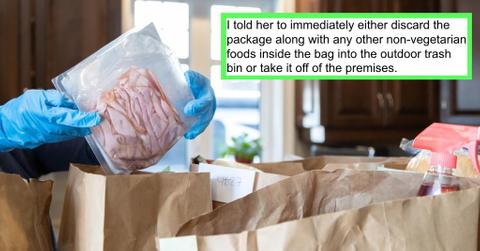
Landlord tries to evict tenant for bringing meat into 'vegetarian apartment'
By Robin ZlotnickDec. 17 2024, Updated 2:41 p.m. ET
This post in Reddit's "Am I the A-hole?" is the most ridiculous thing you will read all day. It's pretty next-level.
It's about a Redditor who rents out a studio apartment in the basement of their house. According to them, it is "very explicitly stated in the lease agreement that tenants are not allowed to bring any non-vegetarian foods onto the premises." Is that not the strangest thing you've ever heard? Well, now OP wants to evict their tenant because they were basically spying on her and saw that she had bought meat. I don't think this is a joke.

Their tenant was unloading her groceries, and OP saw "what was clearly a meat package" inside a grocery bag. OP confronted her about the meat and told her about the lease agreement, she was "bewildered" and "claimed ignorance." I don't know about you, but if I read my lease agreement carefully, a "no-meat" clause would probably glaringly stand out to me.
Either the tenant didn't read the lease closely or she read the clause and found it so insanely ridiculous and random that she thought it was a joke or a typo or something. Both of these options seem plausible.
In any case, OP wasn't going to drop it. They pulled up the lease agreement on their phone and showed her the vegetarian clause. "I told her to immediately either discard the package along with any other non-vegetarian foods inside the bag into the outdoor trash bin or take it off the premises," OP wrote. "I also told her to do the same for the apartment within three days, after which I will conduct an inspection."
The tenant apparently "screamed" and refused to throw away the meat she'd just purchased. Perhaps predictably, days later when OP did the inspection, they found "several packages of meat and a carton of chicken broth inside of the refrigerator."

So OP gave her a 15-day "notice to quit." After those 15 days, OP will begin the eviction process if she doesn't get rid of all non-vegetarian products. "When I handed it to her, she went hysterical and started crying," OP wrote. "She's claiming that I'm violating her 'human rights' and that she'll starve to death."
OK. I know this is a lot to process. On one hand, it seems like a landlord should absolutely not have any control over what their tenant can buy or eat. But on the other hand, I can slightly understand that if you are vegetarian yourself, it might offend you to have the person in your basement apartment cooking meat. Perhaps the smell can be uncomfortably strong.
Still, this clause, if it's legal, should have been made extremely clear at the time the lease was signed, since it's highly irregular for a rental agreement. Commenters on the post pretty unanimously labeled OP the a-hole.
"YTA for trying to police what people eat," one person wrote. "It clearly doesn't actually matter to living in the apartment because otherwise you would have noticed before."

It's unclear how long the tenant has lived there, but she was presumably cooking and eating meat before OP saw her with the bag of groceries, and they'd never noticed before. So maybe the smell doesn't actually travel after all and OP is just being unfair.
"YTA, probably," one person wrote. "Non-standard clauses really should be explicitly pointed out to the tenant... Further, I'm not a lawyer, but you may have put yourself into a pretty bad situation: You can't just write whatever you want into a lease."
Whatever sympathy you may have had left for OP might be quashed when you find out in the comments that OP is actually a vegan, but their wife didn't think they could force their tenant to be vegan, so they settled for the vegetarian clause. They also compared "meat consumption" to slavery, which is all in all a very bad look.
In conclusion, if you're a landlord, please don't tell your tenants what foods they can and can't consume. That's highly irregular and controlling and should have been beyond clear when the tenant moved in. Judging by her reaction, it definitely was not.
This article was originally published on July 23, 2020. It has since been updated.
